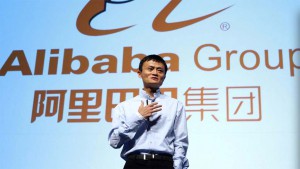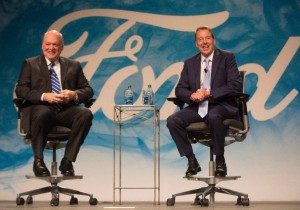
Up til now, Ford and its Lincoln brand have relied on a relatively conventional dealer model in China.
The vast majority of car buyers around the world now rely on the Internet during at least some part of the shopping process, according to industry data, but Ford Motor Co. is expected to take the next big step this week as it announces a new partnership with Chinese online retail giant Alibaba.
Ford CEO Jim Hackett and Chairman Bill Ford are expected to attend a ceremony in Hangzhou on Thursday where they will be joined by representatives of Alibaba Group Holding Ltd. to announce new venture that could include the use of a new “auto vending machine” store concept, reports the Reuters news service.
The tie-up, which is also expected to involve at least some of Ford’s existing Chinese dealers, will come just days after the Detroit-based automaker announced plans to launch 50 new vehicles in the booming Asian nation, 15 of them to rely on electrified propulsion technology. Ford is making an aggressive push to expand its presence in China where it lags well behind rivals General Motors and Volkswagen.
(For more on Ford’s product plans for China, Click Here.)
China is now the world’s largest automotive market, sales of new cars, trucks and crossovers expected to top 24 million for all of 2017, or as much as seven million more than in the U.S. But what had been double-digit growth over the past two decades has slowed substantially and may dip to less than 2% for all of this year, according to a forecast by IHS Automotive, which expects demand growth to continue at a slow pace for at least the next few years.
That has forced manufacturers to battle for market share, putting pressure on profits as they add new products while also trimming prices and increasing incentives.
Carmakers also are exploring new retail strategies that are, in many cases, off limits in more established markets like the U.S. and Europe. Ford’s Lincoln brand has set up an expanding network of showrooms that serve as much as destinations as dealerships.
(Lincoln losing the confusing “MK” model names with launch of new Nautilus. Click Here for the rest of the story.)
Now, the Ford brand is set to experiment with online sales, according to the Reuters report. It will partner with Alibaba, China’s equivalent of U.S. giant Amazon. The alliance will explore two options according to the story. That appears to include the ability to buy directly online, with traditional dealers then delivering vehicles to a buyer’s home or office.
Buyers may also have the option to pick up their new vehicle through Alibaba’s retail arm, Tmall, which would set up the equivalent of an “Automotive Vending Machine,” a multi-story parking garage. Like a traditional vending machine, the vehicle would be delivered to the ground floor.
The move could run into resistance from Ford’s Chinese dealers, however, as they would see their role in the sales process diminished – while also losing out on lucrative financing deals. Buyers would put down 10% and then pay off their vehicles through Alibaba’s own finance unit, Alipay.
“If this format gained steam, it would definitely impact dealers,” Yale Zhang, head of Shanghai-based consultancy Automotive Foresight, told Reuters. “Retail innovation is great, but it is by its nature disruptive and can’t keep everybody happy.”
Automakers have been looking to take advantage of the rapid growth and changes in the Chinese automotive market. Less than a decade ago, most buyers traditionally paying by cash, arriving at showrooms with suitcases full of RMB, the Chinese currency. As the market has grown, however, financing has gained traction, creating opportunities for both manufacturers and lenders to come up with creative alternatives.
China’s booming middle class has also embraced online retailing at a pace that rivals what has happened in the U.S. The key difference is that there are fewer regulations restricting experiments like what Ford and Alibaba are expected to announce.
That said, manufacturers are looking for ways to move more of the shopping experience online in the States. Volvo, for example, recently launched a new subscription service, Care by Volvo, which allows a customer to sign up online for a fixed-price deal on the company’s new XC40 utility vehicle. Dealers still complete the transaction, though they will deliver a new vehicle to a buyer’s home or office, if so desired.
(Click Here for more on the Care by Volvo program.)


